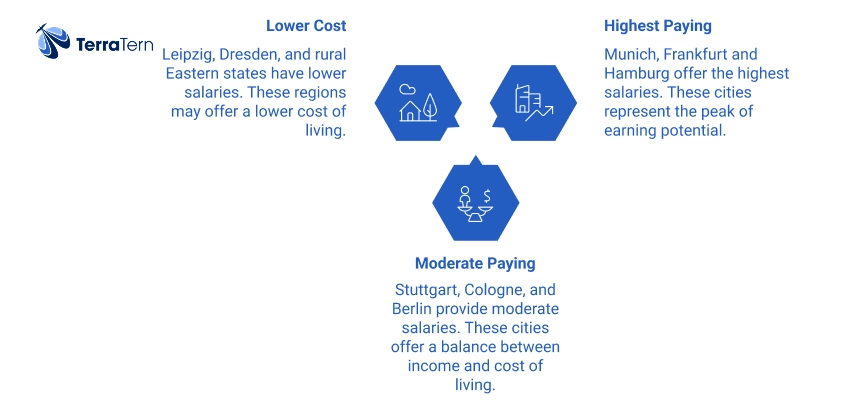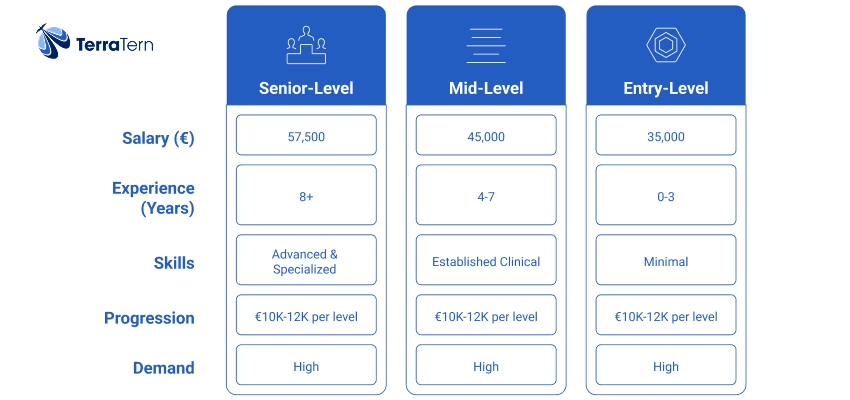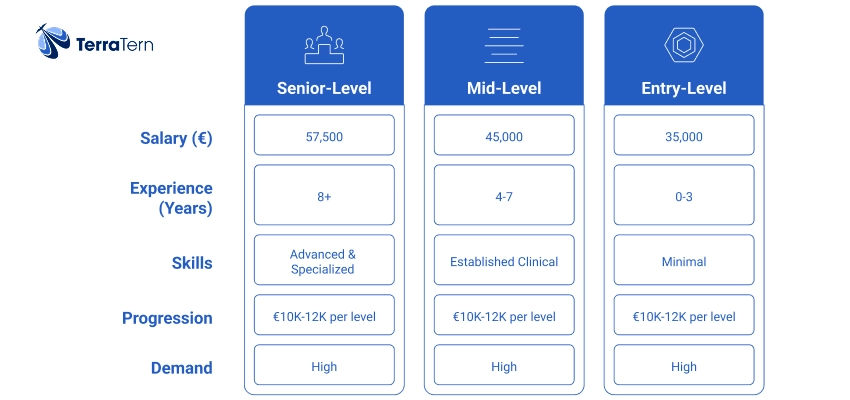Key Highlights
- Benefits of Being a Physiotherapist in Germany
- Latest Facts and News:
- Overview of Physiotherapist Salary in Germany 2025
- Physiotherapist Salary in Germany by Experience Level: Updated 2025
- Benefits and Perks for Physiotherapists in Germany
- Regional Variations in Physiotherapist Salary in Germany
- Factors Influencing Physiotherapist Salary in Germany
- Comparing Physiotherapist Salaries: Germany vs. Other Countries
- How to Maximise Your Physiotherapist Salary in Germany?
- Job Market Outlook for Physiotherapist Salary in Germany
- Steps to Become a Physiotherapist in Germany
- Conclusion
Benefits of Being a Physiotherapist in Germany
Here are a few key benefits of being a physiotherapist in Germany.
1. High Demand
2. Competitive Salaries and Benefits
3. Job Security & Stability
4. Excellent Work-Life Balance
5. Professional Development
6. Healthcare Benefits
Latest Facts and News:
-
Germany's healthcare sector continues to grow, with increasing demand for physiotherapists.
-
Recent changes in healthcare policies have positively impacted physiotherapist salaries.
-
The COVID-19 pandemic has highlighted the importance of physiotherapy in rehabilitation.
Overview of Physiotherapist Salary in Germany 2025
In Germany, physiotherapist prices depend on experience, location, and sector, so on average, the yearly wage of physiotherapists amounts to approximately €30,000 - €45,000 per year. The salary received is significantly increased by acquiring years of experience and special competencies. In order to earn the salary of a physiotherapist in Germany, you are usually allowed to work in the cities rather than the smaller towns.​ Additionally, the dramatic increase in the level of the elderly population is the main factor for how the situation therapists are highly required in Germany to the extent that one can say there is a physical therapist shortage; aging is the main cause of it in the different countries of Europe. All these reasons make Germany a leading destination.
Physiotherapist Salary in Germany by Experience Level: Updated 2025
Here’s an overview for physiotherapist salary in Germany by different experience levels:
|
Experience Level |
Description |
Years of Experience |
Annual Average Salary (EURO) |
|
Entry-Level |
Recently graduated or with minimal professional experience. |
0-3 years |
€30,000 – €40,000 |
|
Mid-Level |
Several years of professional experience with established clinical skills. |
4-7 years |
€40,000 – €50,000 |
|
Senior-Level |
Extensive experience and advanced clinical expertise. |
8+ years |
€50,000 – €65,000+ |
Note: This data is as per the latest research of our expert team members.
Also Read: Physiotherapist Jobs in Germany
Benefits and Perks for Physiotherapists in Germany
Here are a few benefits and perks apart from physiotherapist salary in Germany:
1. Comprehensive Health and Insurance Benefits
Aside from the physiotherapist salary in Germany, various health and insurance benefits are given. They are given public or private health insurance that covers medical, dental, and medical costs.
2. Retirement and Pension Plans
In Germany, a physiotherapist can benefit from a variety of retirement and pension plans. This gives them financial security and stability after their work as well. The pensions are given through state plans or private hospitals.
3. Generous Leave Policies
There are generous leave policies for physiotherapists in Germany. They are given around 25-30 days of paid leave for vacation per year. Apart from that, they have left on national holidays and are also eligible for paid sick leave.
4. Work-Life Balance
The physiotherapists have a very flexible work setting. Because of this, they can maintain a good balance between their personal and professional lives. In addition, the work-life balance is highly prioritized in Germany, thus leading to a comfortable working life.
5. Professional Development
The physiotherapists in Germany are presented with numerous means of professional development. Employers often refer to seminars and workshops for physiotherapists are the ones that are to keep them updated with information on the innovation that has recently arisen in this area, and that is the right way of making them better.
Regional Variations in Physiotherapist Salary in Germany

Here’s an overview of regional variations in physiotherapist salary in Germany:
|
Region |
Annual Salary (EURO) |
Annual Salary (INR) |
|
Munich |
€50,000 – €65,000 |
INR 44,00,000 – 57,20,000 |
|
Frankfurt |
€48,000 – €63,000 |
INR 42,24,000 – 55,44,000 |
|
Hamburg |
€45,000 – €62,000 |
INR 39,60,000 – 54,56,000 |
|
Stuttgart |
€45,000 – €60,000 |
INR 39,60,000 – 52,80,000 |
|
Cologne |
€43,000 – €60,000 |
INR 37,84,000 – 52,80,000 |
|
Berlin |
€40,000 – €60,000 |
INR 35,20,000 – 52,80,000 |
|
Leipzig |
€35,000 – €50,000 |
INR 30,80,000 – 44,00,000 |
|
Dresden |
€35,000 – €50,000 |
INR 30,80,000 – 44,00,000 |
|
Rural Eastern States |
€30,000 – €45,000 |
INR 26,40,000 – 39,60,000 ​ |
Note: This data is based on the latest research by our expert team members.
Also, read: Bachelor of Physiotherapy Salary
Factors Influencing Physiotherapist Salary in Germany
Here are a few factors that can affect your physiotherapist salary in Germany:
1. Work Experience
Years of work experience can highly influence your physiotherapist salary in Germany. Entry-level job positions are paid less, and the salary increases with growing experience and seniority.
2. Geographic Location
Physiotherapists employed in bigger cities, such as Berlin, Munich, Hamburg, and Frankfurt, receive a better income than those working in smaller towns, which is partially because of the unique high cost of living in these cities. Conversely, even though the number of physiotherapists is large in more rural areas, they are not offering similar salary rates.
3. Education and Qualifications
It can be generally observed that physiotherapists possessing higher educational qualifications, such as bachelor’s or master’s degrees from recognized colleges or universities, have a tendency to earn a greater amount of salary than their counterparts who hold only vocational diplomas.
4. Type of Employer
It can be noted that physiotherapists with a higher educational background, like a bachelor’s or a master’s degree from an accredited institution, tend to earn a higher salary than those who have only vocational diplomas.
5. Specialisation
In Germany, physiotherapy salaries can vary a lot according to the area of specialization, e.g., sports physiotherapy, pediatrics, neurology, and others. Physiotherapists who can present such specialisation certificates usually get higher salaries in such a market.
Comparing Physiotherapist Salaries: Germany vs. Other Countries

Here’s a table comparing physiotherapist salary in Germany with those in other countries:
|
Country |
Average Annual Salary |
Average Annual Salary (INR) |
|
Germany |
€45,000 – €55,000 |
INR 39,60,000 – 48,40,000 |
|
United States |
$80,000 – $95,000 |
INR 66,40,000 – 78,85,000 |
|
Canada |
CAD 65,000 – CAD 80,000 |
INR 39,65,000 – 48,80,000 |
|
United Kingdom |
£30,000 – £40,000 |
INR 30,30,000 – 40,40,000 |
|
Australia |
AUD 70,000 – AUD 85,000 |
INR 37,10,000 – 45,05,000 |
|
France |
€30,000 – €40,000 |
INR 26,40,000 – 35,20,000 |
|
Spain |
€25,000 – €35,000 |
INR 22,00,000 – 30,80,000 |
|
Italy |
€25,000 – €35,000 |
INR 22,00,000 – 30,80,000 |
|
Switzerland |
CHF 70,000 – CHF 90,000 |
INR 64,40,000 – 82,80,000 |
|
Netherlands |
€40,000 – €50,000 |
INR 35,20,000 – 44,00,000 |
Note: This data is based on the latest research by our expert team members.
Also, read: Is Physiotherapy a Good Career
How to Maximise Your Physiotherapist Salary in Germany?
Here are a few methods which can help you to maximise your physiotherapist salary in Germany:
1. Pursue Advanced Certifications and Specializations
If you want to gain financial success by being a physiotherapist, you should consider getting specialized in areas like sports therapy, manual therapy, or neurology. The physiotherapists who are more skilled generally get a higher salary than those who specialize less. Focusing on that area would make you earn a better salary as a physiotherapist in Germany.
2. Gain Experience and Seniority
The more experienced and senior-level physiotherapists are paid more. So try to gain more experience through your work. This can help you achieve higher job positions and increase your physiotherapist salary in Germany.
3. Work in High-Demand Regions
Cities like Munich, Frankfurt, and Hamburg pay physiotherapists more money than the rural regions or parts of the East. To get the highest physiotherapist salary, search for a job in major cities, such as Munich, Germany.
4. Offer Private Practice Services
Being employed in hospitals or clinics, you should also give a thought to offering private services. Creating your physiotherapy practice or offering private counsel can increase your physiotherapist's salary in Germany.
5. Pursue Continuing Education
Engage in continuous professional development through workshops while also being aware of the latest developments and trends in physiotherapy. This can help you broaden your knowledge base, which in turn triggers professional confidence and entices a bigger physiotherapist salary in Germany.
Job Market Outlook for Physiotherapist Salary in Germany
Here’s an overview of the job market outlook for physiotherapist salary in Germany:
1. Salary Outlook
The average physiotherapist salary in Germany is between £30,000 and €45,000 per annum. However, the physiotherapist salary in Germany is influenced mainly by entry level and the number of years of experience.
2. Regional Demand Variations
Urban areas like Berlin, Munich, and Hamburg generally offer more job opportunities and higher salaries compared to rural regions, where demand may be growing but compensation is often lower. The geographical location highly influences the physiotherapist salary in Germany.
3. Employment Sectors
There are career opportunities for physiotherapists in a number of various sectors, such as hospitals, clinics, rehabilitation centers, home healthcare, and sports centers. The salaries of physiotherapists in Germany are dependent on the particular sector they are engaged in and the level of their skills and experience.
4. Demand for Physiotherapists
Due to the aging population, the demand for physiotherapists in Germany has risen. Additionally, physiotherapy services must address age-related issues such as arthritis, osteoporosis, and mobility impairment.
Steps to Become a Physiotherapist in Germany

Follow the given steps to become a physiotherapist in Germany:
1. Job Research
The first step you must take is to understand the jobs and responsibilities of physiotherapists in Germany. Knowing the job profile is a key step to making a successful application.
2. Educational Requirements
In Germany, the only candidate who is usually considered for the physiotherapy job is the one who has completed a bachelor's degree. Also, the candidate must fulfill the two requirements, which are the usual standards for diplomas from state-recognized universities and the specific vocational training, aside from being given the diploma in physiotherapy.
3. Practical Training and Internships
Germany, where the physiotherapy job is available, can be the destination of choice for getting a job in physiotherapy, and how much experience can be accrued through an internship in a clinic or hospital that is also out there. Also, the candidate with a history of participating in clinical rounds has been shown to have the skills and knowledge that are essential in this field.
4. Obtain Professional Licensing
In Germany, a professional license is a prerequisite to ensuring that a physiotherapy session is done by experienced specialists in this field of work. All physiotherapists who want to work in Germany know that this is not easy. Physiotherapists usually have to sit a test to get a license and certification.
5. Seek Employment
The main responsibility of sending your CVs to hospitals, rehabilitation centers, private clinics, sports facilities, or nursing homes in Germany is yours. Besides, sending your CV to all potential companies/organizations is also a good idea so they know you are job seeking. Whereas it may not have great gross earnings, it can still be worth the tacit consent to the part of such clinics as in the case of such a job that the assignment is, for example, physiotherapists in this way related to rehabilitation programs.
Conclusion
The income of physiotherapists in Germany is excellent and advantageous for the professionals who are involved in this employment sector. Thanks to the several available career paths and the constant development possibilities for workers in this field, the job description is usually appealing. Furthermore, physical therapists may also work off hours and sometimes even remotely. This means that they can be more easy-going in merging their personal and professional lives. Conversely, the best reason why PTA jobs are so appealing to physiotherapy experts from all over the globe is that salaries in Germany are quite attractive.
If you’re looking for physiotherapy jobs in Germany, then this guide is just for you, and to make your journey easier, TerraTern is right there for you. With its excellent services, we can help you with the whole immigration process to Germany.






